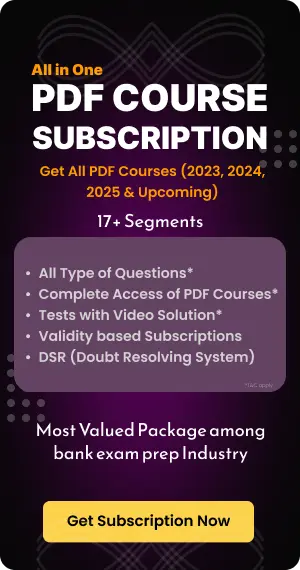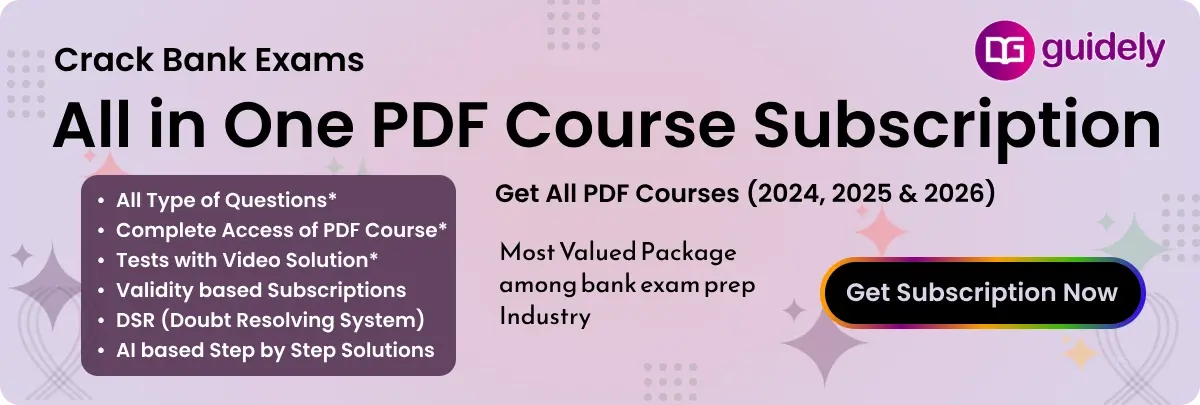CAIIB HRM Syllabus 2025: Human Resources Management Key Modules & Study Tips
May 27 2025
Equip yourself with the latest CAIIB HRM Syllabus 2025 PDF, offering key modules and effective study tips to boost your preparation. The Certified Associate of the Indian Institute of Bankers (CAIIB) exam is a key certification for banking professionals, enhancing their expertise in areas like banking operations, risk management, and financial regulations. HRM (Human Resources Management) is a crucial subject in the CAIIB exam. To prepare for the CAIIB HRM exam, candidates must go through the updated CAIIB HRM Syllabus 2025 PDF, packed with key modules and practical study tips. Familiarizing yourself with the revised CAIIB HRM syllabus will help you effectively prioritize the topics in your preparation.
Download CAIIB HRM Syllabus 2025 PDF
About CAIIB HRM Exam
Here we have provided the key details of the CAIIB Human Resources Management Exam:
- HRM is an Elective paper in CAIIB
- Total questions - 100.
- Total marks - 100
- Exam Duration - 2 hours
- There will be no negative marking for wrong answers.
Download CAIIB Syllabus 2025 - For All Papers
CAIIB HRM Syllabus 2025 - Key Modules
Here is the CAIIB HRM Syllabus 2025: Human Resources Management, which includes 4 modules as outlined below:
- Module A - Human Resource Management
- Module B - Building an HR Strategy
- Module C - Motivation, Training, and Skill Development
- Module D - Personnel Management and Industrial Relations
- Module E - Emerging Scenario in HRM
CAIIB HRM Syllabus 2025 - Module A - Human Resource Management
Check the CAIIB HRM syllabus 2025 - Module A - Human Resource Management:
|
CAIIB New syllabus 2025 pdf for Elective paper 2 - Module A - Human Resource Management |
|
|
Fundamentals of HRM |
Fundamentals of HRM; New Insights into HR Management; Ethics in Human Resource Management (HRM) |
|
Organisational Behaviour |
Behavioural Dynamics in Organisations; The Person – Job Fit; Group Dynamics; Leadership and Team Effectiveness; Some Contemporary Approaches to Leadership; Transformational Leadership; Human Resource Implications of Benchmarking; Quality Initiatives in Organisations; ‘Quality Circle’: A HR Strategy to Quality Improvement; ‘Six Sigma’: A Model for Improving in Business Processes; Positive Attitude: The Core Behavioural Capital of Organisations; Stress Management; Business Etiquettes |
|
Organisational Change |
Change and Development; Change Agent; Managing Change; John P Kotter’s eight step to successful change; ‘Responsibility Charting |
|
HRM in Indian Banks |
Traditional Role of HRM in Indian Banks; Expectations from HR Department; Changing Profile of ‘HRM’ in Banks; Major HRM Challenges Facing Banks; Core Banking and People Challenges |
|
Knowledge Management |
Concept of Knowledge Management (KM); Significant Features of Knowledge Management; Knowledge Management in Banks; IT & Database Management |
CAIIB HRM Syllabus 2025 - Module B - Building an HR Strategy
Check the CAIIB HRM syllabus 2025 - Module B - Building an HR Strategy:
|
CAIIB New syllabus 2025 pdf for Elective paper 2 - Module B - Building an HR Strategy |
|
|
HR as a Strategic Player |
HR as a Strategic Player & Strategic HRM; HR Strategy Formulation and Implementation; Need for a Distinctive HR Strategy; Creating Business Value Through HR Strategy; ‘Factor Analysis’ in HRM; Connecting ‘Strategy’ to Organisations; Strategy Execution; Aligning HR System with Decision Framework |
|
CEO and his/her Team |
Roles and Responsibilities of CEO; CEO and Talent Management; Executive and Line Managers; Succession Planning; ‘Job Family’: An Integrated Model for sustained Succession Planning & Talent Management; Human Resource Audit |
|
Communication |
Organisational Communication; Types of Communication; Barriers to Effective Communication; Steps for Effective Communication; HR and Communication |
|
HR Functions |
Human Resource Planning (HRP); Recruitment and Selection; Impact of Technology on Critical HR Functions; ‘Social Media Policy’ for Organisations : Need and Contents thereof; Compensation; Incentive Based Compensation; Attrition/Turnover Management; Employee Risk Assessment Systems in Banks |
|
Performance Management |
Performance Management System (PMS); Performance Appraisal System; 360-Degree Appraisal; Competency Mapping; Key Result Areas (KRAs) |
CAIIB Syllabus 2025 - Module C - Motivation, Training and Skill Development
Check here the CAIIB new syllabus 2025 - Module C - Motivation, Training and Skill Development:
|
CAIIB syllabus 2025 pdf for Elective paper 2 - Module C - Motivation, Training and Skill Development |
|
|
The Learning Process |
Human Implications of Organisations; The Learning Theory; The Learning Process; Employee Behaviour |
|
Employee Motivation |
Types of Motivation; Motivational Theories; Employee Attitude Development; Practical Applications of Motivation; Job Enrichment; Job Enlargement; Job Rotation; Job Satisfaction |
|
Employee Development |
Basic Objectives of ‘Training’; Training & Development: Its Need; Concepts and differences of ‘Training’, ‘Development’ and ‘Learning’; ‘Training Need’: Methods for Identification of Training Needs; Role and Impact of Training; Changing Face of Banking in India; Future of Bank Education in India |
|
Training Methodology |
Subject Matter of Training: ‘Learning Organisations’; Training Methodology; Current Trends in Training; Types of Training; Benefits of Training; Training & Career Development; Soft Skills Training; Challenges in Training in Banks; Training Infrastructure in Banks; Talent Management; Creative Talents & Dynamic Leadership: A Winning Combination; Strategies to hone up Leadership Skills; Training for the New Generation; Return on Investment (RoI) on Training; Measuring the Success of Training; Best Practices in Training to Help Organisations |
CAIIB New Syllabus 2025 - Module D - Personnel Management and Industrial Relations
Check the CAIIB HRM syllabus 2025 - Module D - Personnel Management and Industrial Relations:
|
CAIIB HRM syllabus 2025 pdf for Elective paper 2 - Module D - Personnel Management and Industrial Relations |
|
|
Industrial Relations (Part A) |
Personnel Function; Legal Aspects of Personnel Function; Legislation on Working Conditions; Industrial Relations Code 2020; Legislation on Wages; Legislation on Social Security; Legislation on Employment and Training; The Changing Scenario |
|
Industrial Relations (Part B) |
Historical Background of Trade Union Movement; Trade Unions in Banks; Industrial Relations; Collective Bargaining |
|
Employee Discipline (Grievance Redressal and Discipline) |
‘Grievance’: Concept and Definition; Causes & Effects of ‘Grievance’; Grievance Redressal Mechanism; Conflict Management; Management Dilemma |
|
Workers’ Participation in Management (WPM) |
‘Participation’: Concept & Definition, Types; Methods of Participation; Indian Banking Experience on Workers’ Participation in Management (WPM) |
|
Employee Discipline (Discipline Management) |
Discipline at Workplace; Discipline Management; Disciplinary Rules in Banks; Domestic Enquiry; Frauds in Banks; The Risk Attached to Delegation of Financial Powers; Need for Vigilance Department in Banks; Diversity and Gender Issues; Dealing with Cases of Sexual Harassment; The Sexual Harassment of Women at Workplace (Prevention, Prohibition and Redressal) Act, 2013 (POSH ACT) |
CAIIB Syllabus 2025 - Module E - Emerging Scenario in HRM
Check the CAIIB syllabus 2025 - Module E - Emerging Scenario in HRM:
|
CAIIB New syllabus 2025 pdf for Elective paper 2 - Module E - Emerging Scenario in HRM |
|
|
Contemporary Practices in Employee Engagement |
Concept and Definition of ‘Émployee Engagement’; Various features and characteristics of ‘Employee Engagement’; Drivers of ‘Émployee Engagement’; Need for creative strategies for engaging Gen ‘Y’ Employees; Contemporary ‘Employee Engagement’ strategies; ‘Work From Home’: Emerging New Normal in Organisations; Strategies to Keep Employees Engaged When They are Working From Home (WFH); ‘Hybrid Model’ of working: Unifying the Physical and Virtual; ‘U-Work’ & ‘Ópen2u’: New and Novel Employment Models; Legal Frame-Work in India to Regulate New Models of Work |
|
Organisational Culture & Creativity: New Imperatives |
Definition and Characteristics of ‘Individual Culture’ and ‘Organizational Culture’; Concept and Features of ‘Individual Creativity’ and ‘Organisational Creativity’; Distinction between ‘Creativity’ & ‘Ínnovation’; Impact of ‘Culture’ on ‘Creativity’ and Vice-Versa in Organisations; Essential Qualities of a ‘Creative Leader/Manager’; Strategies to Create ‘Ethical Organizational Culture’ |
|
‘Corporate Sustainability’ & ‘Green HRM’: A Social & Environmental Approach to People Management |
Concept of ‘Corporate Sustainability’; Evolution from ‘Strategic HRM’ to ‘Sustainable HRM’; Various Forms of ‘Sustainable HRM’; ‘Green HRM’: An Environmental Approach to HRM; ‘Green HRM’ Practices in Banking Industry: Possibilities and Prospects; The Way Forward |
|
‘HR Analytics’, ‘HR Entrepreneurship’ & ‘AI-Based HR Solutions’: New HR Trends for Future |
‘HR Analytics’: Conceptual Understanding; ‘HR Metrics’ vs ‘HR Analytics’; Advantages and Disadvantages of ‘HR Analytics’; ‘HR Entrepreneurship’: The future Buzzword; Introduction to ‘Artificial Intelligence’; Role of ‘Artificial Intelligence’ in HR Functions |
|
Leading in a ‘VUCA’ & ‘BANI’ Scenarios: New Approaches in ‘Crisis Management’ |
‘Crisis’: Concept, Definition, Features & Sources; ‘Crisis Management’: Concept, Features & Need; FourLevels of ‘Uncertainty’: Strategies to Manage; ‘VUCA’: Gravity-Driven Approach to ‘Uncertainty’ and ‘Crisis Management’ in Organizations; Evolution of ‘BANI’ Approach in Crisis Management; ‘VUCA’ or ‘BANI’: Which is to be the Vision for Organisations to Deal with the Crisis?; Typical Models of ‘Crisis Management’ Process; Role of HR in ‘Crisis Management’ Process; Leadership Role in ‘Crisis Management’; Role of Employees in ‘Crisis Management’ |
|
‘Business Ethics’, ‘Corporate Governance’ & ‘Corporate Social Responsibility’: A Winning Combination for Organisational Excellence |
‘Business Ethics’: A Treasure of Trust; Areas of ‘Business Ethics’; Theories of ‘Business Ethics’; Characteristics of an ‘Ethical Organisation’; ‘Corporate Governance’: Shareholders’ Primary; Major Best Practices for Improving ‘Corporate Governance’; Ethical issues in ‘Corporate Governance’; ‘Corporate Social Responsibility’(CSR): A Resolve Towards Commitment to ‘Business Ethics’ & ‘Social Wellbeing; Various Models of ‘Corporate Social Responsibility’; ‘Corporate Social Responsibility’: Indian Experience |
CAIIB HRM Study Tips 2025
Here are comprehensive study tips and preparation strategies to guide you in your preparation. Adopt these tips consistently to enhance your preparation and perform well in the upcoming CAIIB HRM exam.
-
Familiarize Yourself with the Entire Syllabus: Go through the CAIIB HRM syllabus in-depth. Understand the important topics and break them down into smaller, more manageable parts.
-
Create a Study Plan: Develop a study timetable that covers all the modules, ensuring enough time for revision. Allocate more time to complex or weaker areas.
-
Practice Previous Year Papers: By practicing previous year question papers and mock tests, you'll familiarize yourself with the exam structure and improve your ability to manage time efficiently.
-
Stay Updated on Current Affairs: Stay updated on the current affairs and latest trends in Human Resource Management, such as new labor laws, policies, and technological advancements in HR practices.
-
Revise Regularly: Regular revision is essential for retaining information. Make sure to review your notes and key concepts regularly to strengthen your memory.
-
Take Notes: Take clear and concise notes while studying. Taking notes aids in retention and ensures you have a quick reference for later revisions.
- Group Study or Discussion: Whenever possible, join study groups or engage in discussions with fellow aspirants. This can offer fresh insights and help clear any doubts you may have.
FAQs
Q: Where can I get the CAIIB HRM syllabus topics?
On this page, you can get the complete topics for CAIIB Human Resources Management.
Q: Can I get CAIIB HRM Study Tips 2025 for my preparation?
Yes, we have provided the CAIIB Human Resources Management study tips 2025 on this page for your preparation.
JAIIB Foundation Batch Nov 2025 Bilingual
- 250+ Interactive Live Classes
- Learn From working CAs And Banking professionals.
- Special Live Classes timing - Late Evening and Early Morning (Non Banking Hours)
- 24*7 Access to Recorded Videos
- Bilingual Medium (Explanation in Hindi & Content in English)
- A detailed Comprehensive Batch to cover complete Syllabus
- Course Validity till JAIIB Nov 2025 Exam Cycle.
CAIIB Foundation Batch Dec 2025 Bilingual
- 250+ Interactive Live Classes Covering All 4 Compulsary Papers
- Learn From working Banking professionals who already cleard CAIIB.
- PDF Notes of entire Class Content for Revision.
- Special Live Classes timing - Late Evening and Early Morning (Non Banking Hours)
- 24*7 Access to Recorded Videos and Class Notes.
- Bilingual Medium (Explanation in Hindi & Content in English)
- Course Validity till CAIIB Dec 2025 Exam Cycle.
Indian Economy and Indian Financial System 2025 - JAIIB
- 10 Full Lenght test
- Latest Exam Pattern
- Seperate telegram Group for Doubt Clearing
- Accessible on Mobile app
Accounting and Financial Management 2025 - JAIIB
- 10 Full Lenght test
- Latest Exam Pattern
- Seperate telegram Group for Doubt Clearing
- Accessible on Mobile app
Principles and Practices of Banking 2025 - JAIIB
- 10 Full Lenght test
- Latest Exam Pattern
- Seperate telegram Group for Doubt Clearing
- Accessible on Mobile app
Retail Banking and Wealth Management 2025 - JAIIB
- 10 Full Lenght test
- Latest Exam Pattern
- Seperate telegram Group for Doubt Clearing
- Accessible on Mobile app






